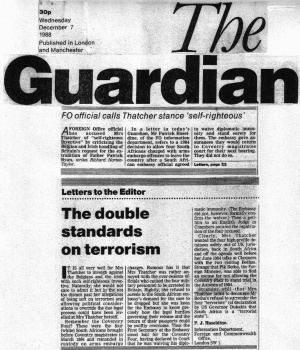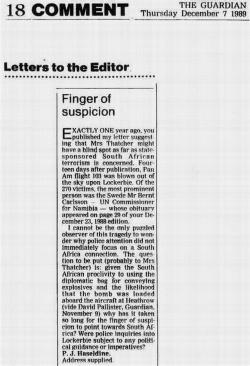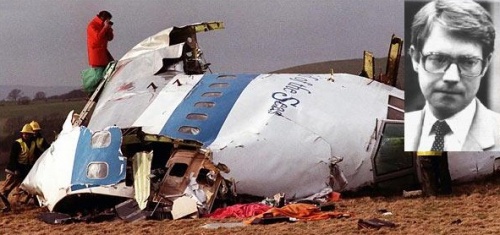David Pallister
 | |
| Founder of | Exaro |
Award-winning journalist and author | |
David Pallister is an award-winning British investigative journalist. He worked on The Guardian from 1974 to 2009, specialising in miscarriages of justice, the arms trade, corruption in international business, terrorism and terrorist financing (post 9/11), mercenaries, race relations and Africa. For ten years from 1983 he was The Guardian London-based correspondent for Nigeria, later covering the Lebanese Civil War, the Ethiopian famine and the Sri Lankan civil war.
UN arms embargo
Following FCO diplomat Patrick Haseldine's letter to The Guardian criticising prime minister Margaret Thatcher, David Pallister wrote an explanatory article on 8 December 1988:
- The Coventry Four, led by a colonel in the South African Defence Force, Hendrik Botha, was one of the most successful undercover teams in South Africa's efforts to circumvent the United Nations arms embargo.
- Using a group of Midlands businessmen, the team channelled millions of pounds worth of high technology parts from America and Europe to South Africa for six years from 1978. It was instrumental in keeping aloft South Africa's ageing Buccaneer light bombers, used in raids in Angola and Namibia.
- Five businessmen were sentenced for their part in the trade at Birmingham crown court in July 1985, but the South Africans, who had been allowed to return home on bail, refused to attend their trial on the orders of their government.
- The furore caused a blip in official Anglo-South African relations and fury among opponents of Pretoria. Despite repeated assurances of action to the anti-apartheid movement, the British Government did nothing but seek an explanation from the then ambassador, Mr Denis Worrall.
- A Labour front bench spokesman, Mr Donald Anderson, described the Government's response as "cool, lame and laid back and essentially 'business as usual' with the South African Government".
- The four, employed by Armscor, Pretoria's arms procurement agency, were arrested by Customs in March 1984 at a London hotel. Besides Colonel Botha, they were Stephanus de Jager, William Metelerkamp and Jacobus la Grange.
- They were first remanded in custody by Coventry magistrates. Mr Worrall's successor as ambassador, Mr Marais Steyn, was promptly recalled to Pretoria for consultations.
- In April, the four were granted bail after the first secretary at the embassy, Mr André Pelser, offered to waive his diplomatic immunity and stand surety of £25,000 each with a £100,000 surety of his own. Their passports were confiscated and they were ordered to report daily to police from accommodation to be found by the embassy.
- Six weeks later, after the magistrates refused to relax their bail conditions, they went before Mr Justice Leonard, sitting in chambers in the High Court. In an unusual ruling which allowed accused criminals to leave the jurisdiction, the judge agreed the men could go home on condition they returned for the next court hearing in June. Bail was doubled to £400,000. The four turned up in June for another remand, but South Africa then found a reason to avoid a trial.
- In September, the South African Foreign Minister, Mr Pik Botha, said the four would not be returned because Britain refused to hand over to the South African police six anti-apartheid leaders who had sought refuge at the British consulate in Durban.
- When the case came up again at Coventry magistrates in October, counsel for the South African Government, Mr George Carman QC, said:
- "They were simply obeying the expressed intention of their own government."
- Mr Pelser, who remained at the embassy for another two years, agreed to forfeit the bail money.
- The then Foreign Office Minister of State, Mr Malcolm Rifkind, told the Commons that relations with Pretoria would be "significantly affected" if South Africa continued to make no effort to co-operate with the British courts.
- The response from Pretoria was a calculated insult. The four men were presented at a press conference by Armscor from which foreign journalists were excluded. They claimed they had been subjected to seven weeks of degrading treatment at Winson Green prison in Birmingham and Colonel Botha spoke with pride that "our own contribution helped South Africa to develop many weapon systems." He said the £400,000 was peanuts compared with the money they had saved the country in weapons purchases.
- Britain has been remarkably lax in its treatment of illegal arms dealers to South Africa and South African diplomats implicated in illegal acts. In 1982, an Old Bailey trial heard that part of a £1 million arms racket to South Africa was paid for from the embassy. No action was taken.[1]
Exaro
In 2012 David Pallister joined the investigative news website Exaro[2] where he has written extensively on a broad range of topics, including an article entitled "Lonmin started as mining interests of Tiny Rowland's Lonrho" about the unrest at Lonmin’s platinum mine in Marikana, South Africa.[3] He is on the editorial advisory board of the Bureau of Investigative Journalism.
Awards
David Pallister was centrally involved as a personal libel defendant in the dénouement of Jonathan Aitken, causing Aitken to be convicted and jailed for perjury. He was a Guardian team member at the British Press Awards for the Neil Hamilton affair (1997) and the Aitken case (1998). He won a 'Project Censored' award[4] from Sonoma State University (2002, with Greg Palast) on the failure of the FBI to investigate the Bin Laden family. In 1999 his reporting of the Stephen Lawrence case was shortlisted for a Commission for Racial Equality media award.
Bibliography
David Pallister is the author (with Sarah Stewart and Ian Lepper) of "South Africa Inc.: The Oppenheimer Empire" (Simon & Schuster, 1987). He helped Gerry Conlon of the Guildford Four with his autobiography, "Proved Innocent" (Hamish Hamilton, 1990). With Luke Harding and David Leigh, he was co-author of "The Liar: The Fall of Jonathan Aitken" (Penguin, 1997).
References
Wikipedia is not affiliated with Wikispooks. Original page source here


